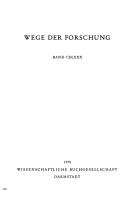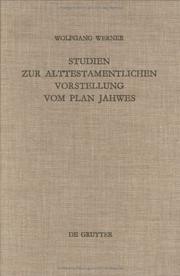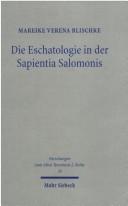| Listing 1 - 9 of 9 |
Sort by
|
Book
ISBN: 0567094537 9780567094537 Year: 1987 Publisher: Edinburgh: Clark,
Abstract | Keywords | Export | Availability | Bookmark
 Loading...
Loading...Choose an application
- Reference Manager
- EndNote
- RefWorks (Direct export to RefWorks)
Eschatology --- Biblical teaching. --- Bible. --- Criticism, interpretation, etc. --- 221.08*6 --- 236 --- Theologie van het Oude Testament: heilsgeschiedenis --- Eschatologie. De novissimis --- 221.08*6 Theologie van het Oude Testament: heilsgeschiedenis --- Eschatology - Biblical teaching.

ISBN: 3534070364 9783534070367 Year: 1978 Volume: 480 Publisher: Darmstadt: Wissenschaftliche Buchgesellschaft,
Abstract | Keywords | Export | Availability | Bookmark
 Loading...
Loading...Choose an application
- Reference Manager
- EndNote
- RefWorks (Direct export to RefWorks)
Christian dogmatics --- Bible OT --- Eschatology --- Biblical teaching --- 221.08*6 --- -#GROL:SEMI-221.08*3 --- Last things (Theology) --- Religious thought --- Theology, Doctrinal --- Theologie van het Oude Testament: heilsgeschiedenis --- 221.08*6 Theologie van het Oude Testament: heilsgeschiedenis --- #GROL:SEMI-221.08*3 --- Bible. --- Antico Testamento --- Hebrew Bible --- Hebrew Scriptures --- Kitve-ḳodesh --- Miḳra --- Old Testament --- Palaia Diathēkē --- Pentateuch, Prophets, and Hagiographa --- Sean-Tiomna --- Stary Testament --- Tanakh --- Tawrāt --- Torah, Neviʼim, Ketuvim --- Torah, Neviʼim u-Khetuvim --- Velho Testamento --- Theology. --- Eschatology - Biblical teaching
Book
ISBN: 3460041714 9783460041714 Year: 1985 Volume: 117 Publisher: Stuttgart: KBW,
Abstract | Keywords | Export | Availability | Bookmark
 Loading...
Loading...Choose an application
- Reference Manager
- EndNote
- RefWorks (Direct export to RefWorks)
Creation --- Wisdom literature --- Biblical teaching --- Criticism, interpretation, etc --- 221.08*6 --- -Wisdom literature --- -#GGSB: Exegese O.T. --- #GGSB: Wijsheidsliteratuur --- #GGSB: Tekstkritiek O.T. --- Literature --- Biblical cosmogony --- Cosmogony --- Natural theology --- Teleology --- Beginning --- Biblical cosmology --- Creation windows --- Creationism --- Evolution --- Theologie van het Oude Testament: heilsgeschiedenis --- 221.08*6 Theologie van het Oude Testament: heilsgeschiedenis --- #GGSB: Exegese O.T --- #GGSB: Tekstkritiek O.T --- History and criticism --- Exegese O.T --- Tekstkritiek O.T --- Wijsheidsliteratuur --- Creation - Biblical teaching --- Wisdom literature - Criticism, interpretation, etc
Book
ISBN: 9789042933941 9042933941 Year: 2018 Volume: 3 Publisher: Leuven: Peeters,
Abstract | Keywords | Export | Availability | Bookmark
 Loading...
Loading...Choose an application
- Reference Manager
- EndNote
- RefWorks (Direct export to RefWorks)
This book consists of a theological hermeneutical reading of the meaning of creation in the First Testament as found in the writings of the Jesuit biblical scholar Paul Beauchamp. Out of his engagement in the contemporary dialogue between modern science and theology, Pambrun explores how a community's experience of creation, as expressed in the classical creation texts, represents a work of meaning that configures the Scriptures as a Book. This study examines how Beauchamp's methodological approach to the Law, the Prophets, and Wisdom as distinct classes of writings, each obedient to its own set of operations, permits an encounter to take place among the diverse creation texts. The result is an enriched understanding of the meaning of creation, a meaning governed at its core by a language of hope that, in a world scarred by suffering and violence, attests to the engendering of a new humanity.explores how a community's experience of creation, as expressed in the classical creation texts, represents a work of meaning that configures the Scriptures as a Book. This study examines how Beauchamp's methodological approach to the Law, the Prophets, and Wisdom as distinct classes of writings, each obedient to its own set of operations, permits an encounter to take place among the diverse creation texts. The result is an enriched understanding of the meaning of creation, a meaning governed at its core by a language of hope that, in a world scarred by suffering and violence, attests to the engendering of a new humanity.
Creation --- 231.51 --- 231.51 De Deo creatore. Schepping --- De Deo creatore. Schepping --- Biblical teaching --- Beauchamp, Paul. --- Beauchamp, P. --- Bible. --- Antico Testamento --- Hebrew Bible --- Hebrew Scriptures --- Kitve-ḳodesh --- Miḳra --- Old Testament --- Palaia Diathēkē --- Pentateuch, Prophets, and Hagiographa --- Sean-Tiomna --- Stary Testament --- Tanakh --- Tawrāt --- Torah, Neviʼim, Ketuvim --- Torah, Neviʼim u-Khetuvim --- Velho Testamento --- Criticism, Textual. --- Beauchamp, Paul, --- 221.08*6 --- 221.08*6 Theologie van het Oude Testament: heilsgeschiedenis --- Theologie van het Oude Testament: heilsgeschiedenis --- Beauchamp, Paul, 1925-2001

ISBN: 3110112558 9783110112559 311086326X Year: 1988 Volume: 173 Publisher: Berlin: de Gruyter,
Abstract | Keywords | Export | Availability | Bookmark
 Loading...
Loading...Choose an application
- Reference Manager
- EndNote
- RefWorks (Direct export to RefWorks)
Bible --- Criticism, interpretation, etc --- 221.08*6 --- Theologie van het Oude Testament: heilsgeschiedenis --- 221.08*6 Theologie van het Oude Testament: heilsgeschiedenis --- Bible. --- Antico Testamento --- Hebrew Bible --- Hebrew Scriptures --- Kitve-ḳodesh --- Miḳra --- Old Testament --- Palaia Diathēkē --- Pentateuch, Prophets, and Hagiographa --- Sean-Tiomna --- Stary Testament --- Tanakh --- Tawrāt --- Torah, Neviʼim, Ketuvim --- Torah, Neviʼim u-Khetuvim --- Velho Testamento --- Book of Isaiah (Book of the Old Testament) --- Ēsaias (Book of the Old Testament) --- Esaïe (Book of the Old Testament) --- Isaia (Book of the Old Testament) --- Isaiah (Book of the Old Testament) --- Isaias (Book of the Old Testament) --- Isaïe (Book of the Old Testament) --- Izaya sho --- Jesaja (Book of the Old Testament) --- Jesajabuch (Book of the Old Testament) --- Sefer Y'sha'yah (Book of the Old Testament) --- Yeshaʻyahu (Book of the Old Testament) --- Y'sha'yah (Book of the Old Testament) --- Criticism, interpretation, etc. --- God --- Biblical teaching
Book
ISBN: 3451021102 9783451021107 Year: 1987 Volume: 110 Publisher: Freiburg: Herder,
Abstract | Keywords | Export | Availability | Bookmark
 Loading...
Loading...Choose an application
- Reference Manager
- EndNote
- RefWorks (Direct export to RefWorks)
People of God --- Church --- Kingdom of God --- Biblical teaching --- Congresses --- Bible --- Criticism, interpretation, etc --- 221.08*6 --- -Church --- -Kingdom of God --- -#GOSA:I.OT.Alg.M --- #GOSA:III.Ecc.M --- #GROL:SEMI-221.08*3 --- God, Kingdom of --- Eschatology --- God (Christianity) --- Ecclesiastical theology --- Ecclesiology --- Theology, Ecclesiastical --- Theology --- God, People of --- Kehal Yahveh --- Qehal Jahwe --- Children of God --- Theologie van het Oude Testament: heilsgeschiedenis --- -Congresses --- 221.08*6 Theologie van het Oude Testament: heilsgeschiedenis --- #GOSA:I.OT.Alg.M --- Biblical teaching&delete& --- Bible. --- Antico Testamento --- Hebrew Bible --- Hebrew Scriptures --- Kitve-ḳodesh --- Miḳra --- Old Testament --- Palaia Diathēkē --- Pentateuch, Prophets, and Hagiographa --- Sean-Tiomna --- Stary Testament --- Tanakh --- Tawrāt --- Torah, Neviʼim, Ketuvim --- Torah, Neviʼim u-Khetuvim --- Velho Testamento --- Criticism, interpretation, etc. --- Congresses. --- People of God - Biblical teaching - Congresses --- Church - Biblical teaching - Congresses --- Kingdom of God - Biblical teaching - Congresses

ISBN: 9783161494598 3161494598 Year: 2007 Volume: 26 Publisher: Tübingen: Mohr Siebeck,
Abstract | Keywords | Export | Availability | Bookmark
 Loading...
Loading...Choose an application
- Reference Manager
- EndNote
- RefWorks (Direct export to RefWorks)
Eschatology --- Bible --- Criticism, interpretation, etc --- Eschatology. --- 223.7 --- 221.08*6 --- Last things (Theology) --- Religious thought --- Theology, Doctrinal --- Wijsheid. Wijsheid van Jesus Sirach (Ecclesiasticus) --- Theologie van het Oude Testament: heilsgeschiedenis --- Bible. --- Book of wisdom (Book of the Apocrypha) --- Ḥokhmat Shelomoh (Book of the Apocrypha) --- Ḥokhmata rabata di-Shelomoh Malka (Book of the Apocrypha) --- Liber sapientiae (Book of the Apocrypha) --- Libro della sapienza (Book of the Apocrypha) --- Sapientia Salomonis (Book of the Apocrypha) --- Sefer Ḥokhmat Shelomoh (Book of the Apocrypha) --- Sophia Salōmōn (Book of the Apocrypha) --- Weisheit Salomos (Book of the Apocrypha) --- Wisdom of Solomon (Book of the Apocrypha) --- Livro da sabedoria (Book of the Apocrypha) --- Sabedoria de Salomão (Book of the Apocrypha) --- Criticism, interpretation, etc. --- 221.08*6 Theologie van het Oude Testament: heilsgeschiedenis
Book
ISBN: 9783788724764 3788720301 3788721057 9783788721879 9783788722326 9783788723439 9783788724023 9783788724764 3788721871 9783788725433 9783788725617 9783788726263 9783788726270 9783788726287 9783788726898 9783788727659 9783788728717 9783788726751 9793788727994 378872871X 378872675X 3788725435 9783788721053 Year: 2014 Volume: 136 Publisher: Neukirchen-Vluyn: Neukirchener Theologie,
Abstract | Keywords | Export | Availability | Bookmark
 Loading...
Loading...Choose an application
- Reference Manager
- EndNote
- RefWorks (Direct export to RefWorks)
Im Alten Testament gibt es immer wieder Texte, die mit Gewalt zu tun haben. Ja, Gott selbst ist Urheber von Gewalt und fordert zugleich Menschen zu gewalttätigem Handeln auf. Wie lässt sich diese Tatsache damit vereinbaren, dass Gott ein Gott der Liebe ist? Zugleich stellt sich die Frage, wie wir heute mit solchen Bibeltexten umgehen. Es ist unbestritten, dass es im Alten Testament immer wieder Texte gibt, in denen von Gewalt die Rede ist, ja in denen Gott selbst als Urheber mit Gewaltakten in Verbindung gebracht wird oder Menschen zu gewalttätigem Handeln auffordert. Auch wenn die historisch-kritische Exegese in vielen Fällen die historischen Hintergründe beleuchten und so einen Großteil des Gewaltpotentials der Texte besser verstehbar machen kann, bleiben solche Texte doch anstößig, wenn man auf ihre Rezeptionsgeschichte schaut. Hier stellt sich die beklemmende Frage, ob die literarische Gewalt der Texte im Lauf der Geschichte zur Legitimierung zwischenmenschlicher Gewalt geführt hat und nach manchen Vertretern der aktuellen Diskussion um Religion und Gewalt sogar führen musste. Die vorliegende Studie setzt daher ein mit einer Standortbestimmung in der Diskussion, die besonders von den Beiträgen des Ägyptologen Jan Assmann mit dem Stichwort der "Mosaischen Unterscheidung" angestoßen wurde. Ein zweiter Teil wendet sich mit Einzeluntersuchungen einigen "Gewalttexten" der Hebräischen Bibel zu. Ein dritter Teil ist der Rezeption solcher Texte in den Makkabäerbüchern gewidmet und fragt, wie in dieser späten biblischen Literatur bereits auf die Hebräische Bibel zurückgegriffen wird, um gewalttätiges Handeln oder Herrschaft zu legitimieren. Der Ausblick am Ende des Buches behandelt punktuell die mittelalterliche Makkabäerrezeption und zeichnet nach, wie solche Legitimationsmuster etwa in der Kreuzzugspropaganda, aber auch darüber hinaus, genutzt werden konnten.
222.6 --- #gsdb1 --- Samuelboeken. Boeken der koningen. David. Salomon. Elia. Elisa. Josias --- 221.06*4 --- 221.08*6 --- 221.08*6 Theologie van het Oude Testament: heilsgeschiedenis --- Theologie van het Oude Testament: heilsgeschiedenis --- 221.06*4 Oud Testament: kritische exegese conservatieve eruditie vrij onderzoek --- Oud Testament: kritische exegese conservatieve eruditie vrij onderzoek --- 221.06*4 Oud Testament: kritische exegese; conservatieve eruditie; vrij onderzoek --- Oud Testament: kritische exegese; conservatieve eruditie; vrij onderzoek --- 221.08*3 --- 221.08*3 Theologie van het Oude Testament: themata --- Theologie van het Oude Testament: themata --- Bible. --- Antico Testamento --- Hebrew Bible --- Hebrew Scriptures --- Kitve-ḳodesh --- Miḳra --- Old Testament --- Palaia Diathēkē --- Pentateuch, Prophets, and Hagiographa --- Sean-Tiomna --- Stary Testament --- Tanakh --- Tawrāt --- Torah, Neviʼim, Ketuvim --- Torah, Neviʼim u-Khetuvim --- Velho Testamento --- Criticism, interpretation, etc. --- Samuel (Book of the Old Testament) --- Shemuʼel (Book of the Old Testament)
Book
ISBN: 1575063603 9781575063607 9781575060934 1575060930 Year: 2015 Publisher: Winona Lake, Indiana : Eisenbrauns,
Abstract | Keywords | Export | Availability | Bookmark
 Loading...
Loading...Choose an application
- Reference Manager
- EndNote
- RefWorks (Direct export to RefWorks)
"La 4e de couverture indique : Othmar Keel has become well known as the author of masterly studies on the iconography and texts of the ANE and their relationship to the text of the Hebrew Bible. In this volume, he partners with Silvia Schroer to assemble ANE texts and art that bears on the idea of creation. The result is a convenient assemblage of texts and iconographical data that may be studied in concert, often leading to being able to see old texts in new ways. As with much of this Swiss scholar's work, this new volume will prove to be a resource for all who wish to study the biblical theology of creation against its wider background."
Creation --- Egyptian literature --- Assyro-Babylonian literature --- Assyro-Babylonian religion --- Biblical teaching --- Relation to the Old Testament --- 221.08*6 --- 221.08*6 Theologie van het Oude Testament: heilsgeschiedenis --- Theologie van het Oude Testament: heilsgeschiedenis --- Presocratiques. --- Mythologie assyro-babylonienne. --- Mythologie egyptienne. --- Mythologie. --- Theologie. --- Creation. --- Litterature assyro-babylonienne --- Litterature egyptienne ancienne --- Biblical cosmogony --- Cosmogony --- Natural theology --- Teleology --- Beginning --- Biblical cosmology --- Creation windows --- Creationism --- Evolution --- Relation avec l'Ancien Testament. --- Enseignement biblique. --- Relation to the Old Testament. --- Biblical teaching. --- "Bible. --- Mesopotamie. --- Contribution au concept de création --- Création --- Création (théologie) --- Création divine --- Création du monde --- Création ex nihilo --- Monde, Création du --- Chaos --- Cosmogonie --- Créationnisme --- Le Déluge --- Théologie naturelle --- Création (religion) --- Démiurge --- Fiṭra --- Théologie --- théologie --- épisode biblique --- Doctrines
| Listing 1 - 9 of 9 |
Sort by
|

 Search
Search Feedback
Feedback About UniCat
About UniCat  Help
Help News
News